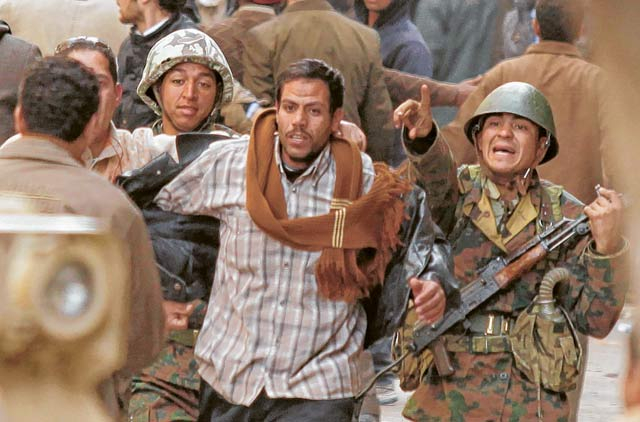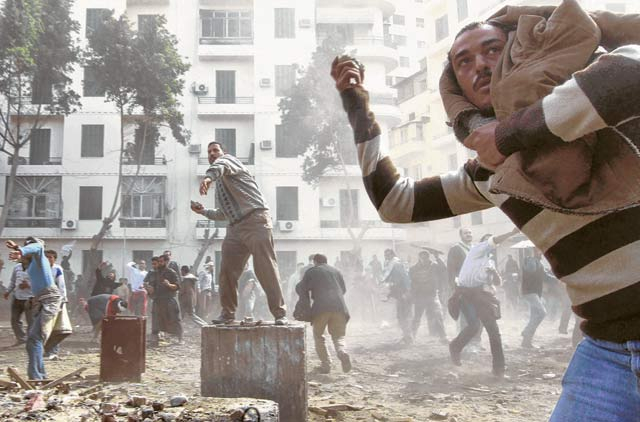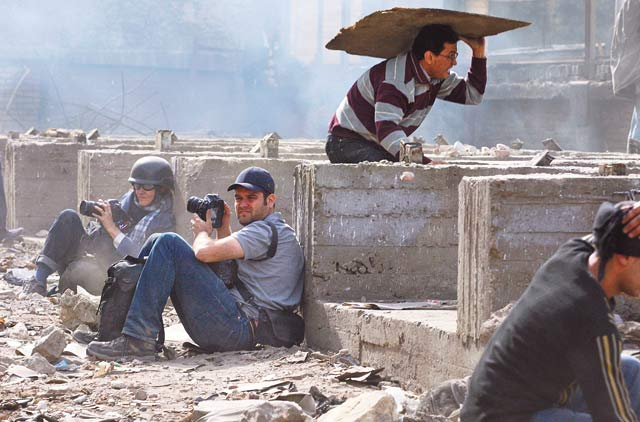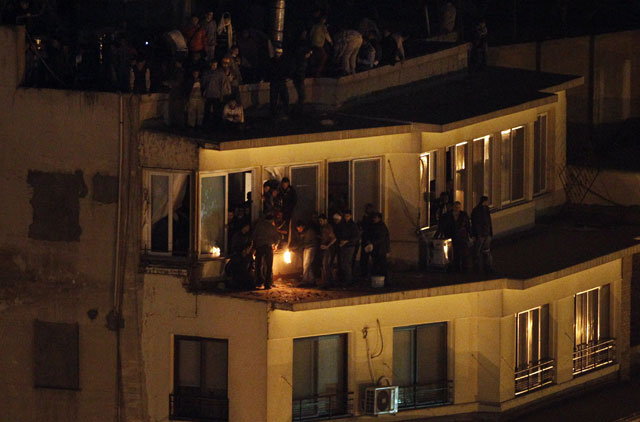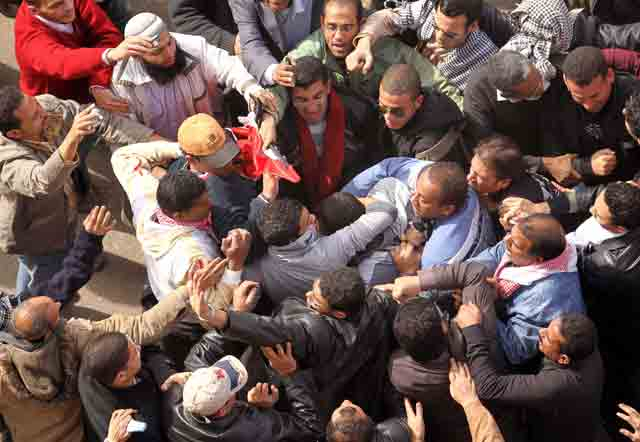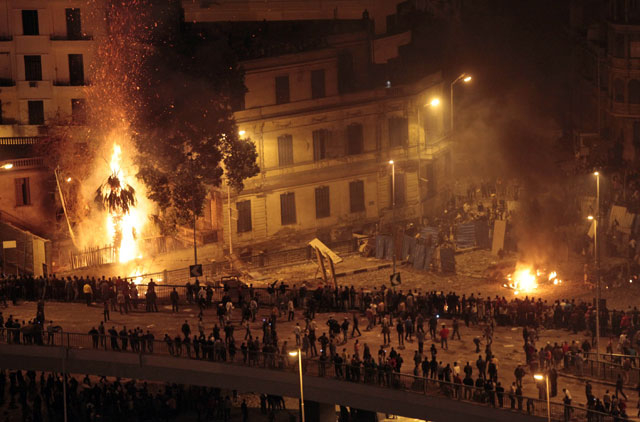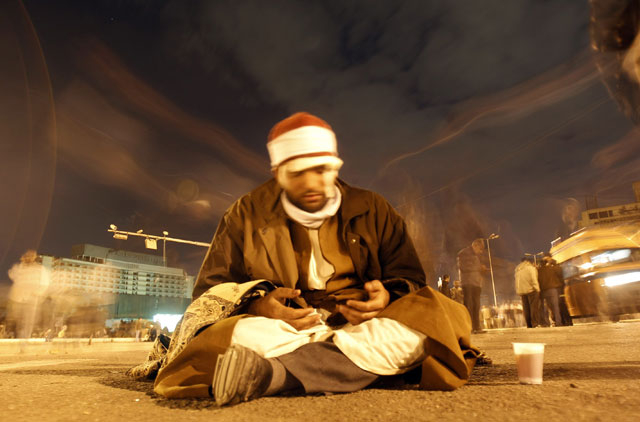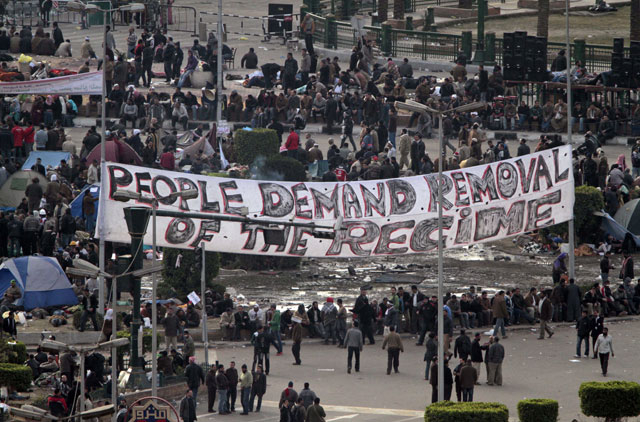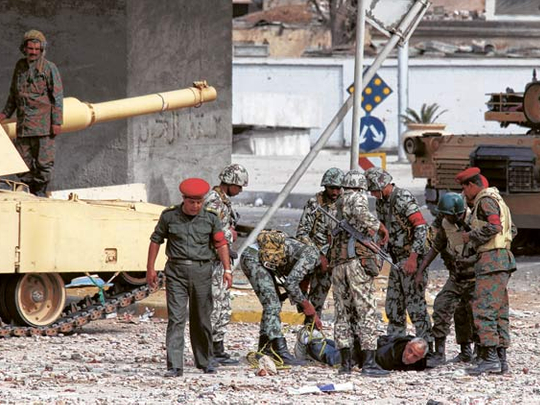
Cairo: Deadly clashes between opponents and partisans of Hosni Mubarak raged for a second day on Thursday as Egypt's vice president urged protesters to go home, criticising their demands for the president's ouster as a "call for chaos."
That was echoed by the 82-year-old veteran president himself, who told ABC television he was "very unhappy" about the fighting and that he would like to step down but feared chaos would engulf the country.
On Tuesday night, Mubarak announced that he would not run for election to a sixth term in September, but said he would finish his mandate so he could guarantee an orderly transition.
He said he was "fed-up with being president and would like to leave office now, but cannot, he says, for fear that the country would sink into chaos," ABC's Christiane Amanpour reported after an interview in Cairo.
"I don't care what people say about me. Right now I care about my country, I care about Egypt," Mubarak said as violent protests against his rule stretched into a 10th day.
The veteran leader added: "I was very unhappy about yesterday. I do not want to see Egyptians fighting each other."
But while many protesters have accused government agents of provoking the latest violence, Amanpour said Mubarak "told me that... his government is not responsible for it."
Instead, she said he blamed the powerful Muslim Brotherhood.
Vice President Omar Sulaiman, addressing protesters hunkered down in Cairo's Tahrir Square, said: "End your sit-in. Your demands have been answered."
Only a couple of hours after his remarks were broacast, relatives said seven leaders of the youth protest had been arrested after a meeting with leading dissident Mohamad Al Baradei at a cafe outside Cairo.
The newly appointed second in command and former head of the country's intelligence services also suggested that attacks on protesters that have killed least five people and injured hundreds could have resulted from a plot.
Egyptian Vice President Omar Sulaiman told state television on Thursday that violence against protesters in central Cairo's Tahrir Square could have been the result of a conspiracy.
"We will look into (the violence), into the fact it was a conspiracy," Sulaiman said.
New clashes are heating up again and shots are being fired in the air around Cairo's central Tahrir Square as anti-government protesters push back regime supporters.
The two sides are trading volleys of stone-throwing, but government backers are falling back and protesters are swarming onto a highway overpass from which their rivals had pelted them with stones and firebombs overnight.
Soldiers, who earlier Thursday had separated the two sides and pushed back the pro-government side in an effort to stop the violence, appeared to be allowing the protesters to advance without stopping them.
Gunshots, apparently being fired in the air, were heard, but it was not clear who was firing them.
New Egyptian Prime Minister Ahmed Shafiq said on Thursday he was ready to go to Tahrir Square, the scene of massive anti-regime demonstrations, and talk to protesters, the official MENA news agency said. Shafiq said he spoke by telephone to several pro-democracy youth activists overnight and was "ready to go to Tahrir Square to talk to the protesters," he told Egyptian and Arab reporters, MENA said.
Shahira Amin resigned from Nile TV because of their coverage of the protests - she spoke live to Al Jazeera. She was the deputy head of the station. Two Al Jazeera reporters have just been attacked on their way from airport to central Cairo - more updates soon.
The BBC's John Simpson in Tahrir Square points out: "Yesterday tanks were pointing their guns inwards towards anti-Mubarak protesters - now they have turned the guns away towards the pro-Mubarak camp. I suspect that may be significant."
The Associated Press reports that the Egyptian military has started rounding up journalists, "possibly for their own protection", after they came under attack from Mubarak supporters. An AP reporter saw a group of foreign journalists being detained by the military on a street near Tahrir Square.
Gulf News Reporter Abbas Al Lawati reports: Some well to do families were harassed while delivering food and blankets to opposition protesters at the Qasr Al Nile bridge entrace. Some had the food cartons thrown in the Nile. My driver tells me four foreign journalists were beaten up at the bridge entrance.
Egyptian army tanks and soldiers moved to end violence between anti-government protesters and supporters of President Hosni Mubarak in Cairo's central square after standing by for nearly a day as the two sides battled with rocks, sticks, bottles and firebombs on Thursday.
Thousands of protesters demanding President Hosni Mubarak's ouster stood their ground Thursday against stone-throwing loyalists after Egypt's revolt turned into a deadly battle for a central Cairo square.
Egypt govt denies role in violence, will probe
'To accuse the government of mobilising this is a real fiction' cabinet spokesman says
Cairo: Egypt's cabinet denied on Thursday that it had a role in mobilising supporters of President Hosni Mubarak against anti-government protesters in Cairo's Tahrir Square and said it would investigate those behind violence.
"To accuse the government of mobilising this is a real fiction. That would defeat our object of restoring the calm," cabinet spokesman Magdy Rady told Reuters.
"We were surprised with all these actions," he said.
Prime Minister Ahmed Shafiq told reporters the violence would be investigated and also said it was inviting all parties for talks.
Asked if this include the Muslim Brotherhood, banned from political activities in Egypt and the target for frequent round ups, Shafiq said: "No one will be excluded from the dialogue."
Such a comment would have been unthinkable prior to the anti-government protests that erupted on January 25.
Rady said: "The government will take the measures it can to identify who was behind this and try to deal with this."
Rady also said that the army, sent to the streets on Friday after police lost control of protests, had not intervened because it could have been interpreted as taking sides.
"There is faction here and faction there, they (the army) cannot take a side. If they interfere in one side that will defeat their purpose. It would complicate matters more than helping it," Rady said.
Egyptian Vice President Omar Sulaiman has started a dialogue with "political parties and national forces" amid deadly anti-regime protests, state television announced Thursday.
Meanwhile, five EU nations - Britain, France, Germany, Italy and Spain, urged an immediate political transition to end violent unrest in Egypt, in a joint statement on Thursday.
Egypt's cabinet denied on Thursday that it had a role in mobilising supporters of President Hosni Mubarak against anti-government protesters in Cairo's Tahrir Square and said it would investigate those behind violence.
"To accuse the government of mobilising this is a real fiction. That would defeat our object of restoring the calm," cabinet spokesman Magdy Rady said.
"We were surprised with all these actions," he said.
Prime Minister Ahmad Shafiq said the violence would be investigated, state television reported.
"The government will take the measures it can to identify who was behind this and try to deal with this," Rady said.
Egypt's finance minister says the loss on Egypt's stock exchange following the crisis now exceeds the one during credit crunch.
Five people lost their lives Thursday, as heavy gunfire pounded Cairo's Tahrir Square. A spokesman for the United Nations peacekeeping mission in Cyprus said 350 UN staff based in Egypt will be evacuated to the east Mediterranean island or to the United Arab Emirates.
Egyptian Health Minister Ahmad Samih Farid told state television five had died and 836 were wounded in fighting which first erupted on Wednesday.
Al Jazeera television showed footage of bodies being pulled on the street. The Qatar-based network also showed footage of soldiers detaining people. Women and children too have remained in the square.
The crowds seeking an end to President Hosni Mubarak's nearly three decades in power were still reeling from attacks hours earlier in which Mubarak supporters charged into the square on horses and camels, lashing people with whips, while others rained firebombs and rocks from rooftops.
Live updates
3:32pm: Abbas reports: Protesters shouting for 'victory or martydom'. People here scoff at opposition leaders. Say no one represents them except the people in the square. There is a build up at the museum entrace. People bringing sling shots and bricks. Mohammad Beltagi, from the Muslim Brotherhood has arrived.
3:10pm: Abbas reports: Just asked a soldier what his role here is. He said “protect the people”. I asked then why did you not intervene. He said, “what do you want me to do?” I asked him what his instructions were, he just shrugged.
3pm: UN Secretary-General Ban Ki-moon says all parties in Egypt crisis should "sit down together" to decide their future and the UN ready to help.
2:48pm: BBC's Paul Danahar in Cairo: "I'm watching now a group of anti-Mubarak protestors try to rescue a badly beaten pro-Mubarak man from a mob of men. They are leading him away to safety as other members of the crowd punch and kick him.
2:30pm: Mobile phone operator Vodafone announces that text message services are still down in Egypt and that its network was struggling due to a lack of power and possible damage to its equipment.
2:pm: Abbas reports: Opposition youth beating metal to warn people inside that thugs are coming this way. Opposition is preparing for more confrontation. Many are heading towards entraces to the square primarily the museum side. Another man caught. Opposition showed an interior ministry ID. Spoke to a doctor who said she saw people whose brains had spilled out after being shot with live ammunition.
1:15pm: Egypt's Vice President Omar Sulaiman on Thursday dialogue with the country's political parties and national forces to end 10 days of protests to oust President Hosni Mubarak, State TV reported.
12:45: Abbas says: This side of Tahrir is in full control of the opposition. Crowd is chanting slogans calling for the “execution of the butcher.” An opposition protester here tells me “were not doing this just for Egypt. Its for the entire Arab world. We know Egypt is the catalyst for change in the entire region.”
12:15pm: Gulf News's Abbas Al Lawati says, "I’m at Tahrir Square at the Qasr Al Nile bridge entrace which is under the control of the opposition. Hundreds of opposition supporters are going in a show of support. A group of angry men on the opposition side just beat up a man identified as a police officer. Opposition protesters are now saying not to hand over suspected police officers to the army. The army is colluding according to them".
12:10pm: A BBC Arabic correspondent reports that more pro-democracy activists have been arriving in Tahrir Square. "The majority of those who support the president have now left the square. Opponents of the regime have stood their ground overnight despite coming under attack repeatedly. They are hoping they will be joined by others in order to maintain control of the square."
11:45am: Mona Sahif, who is among the protesters, has given the BBC her description of the violence that erupted on Wednesday and continued overnight: "We started hearing gunshots and from that moment on it was really ugly. There were people among them with rifles they were aiming at our protesters. We had...people dying, we had one witnessed by two of my friends with a shot through the head. Our paramedics confirmed that at least eight were shot with live ammunition in their legs and five were shot either in the chest or head."
11:02am: Attacks against anti-government protesters in Cairo "appear to be organised," Human Rights Watch says.
10:40am: "Four were killed by gunshot - hit in the head," Dr Mohammmad Ismail, treating the injured at a makeshift clinic in Abdul Menem Riad Square, next to Tahrir Square, told media.
10:30am: A blogger on BBC, AZZA from Tahrir Square wrote "Everything is happening in front of the military and they are doing nothing to help. We are all falling one-by-one " adding "People are coming to attack us. I don't know who they are. I want to know what the world is doing watching us dying one by one. Do they want to wait until we are all dead, before they come out and say, 'Hey, you did it'?"
8am: The US State Department has issued a stark travel warning for US citizens in Egypt, urging those who want to leave to "immediately" head for the airport, adding that any delay was "not advisable." US citizens wishing to depart Egypt on USG flight should proceed to airport asap after the end of morning curfew.
Audio: Gulf News Reporter Abbas Al Lawati describes the chaos and violence in Egypt following clashes between demonstrators, to Radio1/Radio2
* Audio supplied by Radio 2
"People are too tired to be terrified," Al Jazeera television quoted a 33-year-old woman in the square as saying.
But she said protesters who launched an unprecedented challenge to Mubarak's 30-year-rule last week would not give up.
"We cannot go back at this point."
Mubarak promised on Tuesday to surrender power in September, angering protesters who want him to quit immediately and prompting the United States to say change "must begin now".
A day later, the army told reformists to go home and Mubarak backers, throwing petrol bombs, wielding sticks and charging on camels and horses, attacked protesters in Tahrir Square in what many saw as a government-backed attempted crackdown.
Anti-Mubarak demonstrators hurled stones back and said the attackers were police in plainclothes. The Interior Ministry denied the accusation, and the government rejected international calls to end violence and begin the transfer of power.
This apparent rebuff along with the spike in violence - after days of relatively calm demonstrations - complicated US calculations for an orderly transition of power in Egypt.
In pointed comments, a senior US official said it was clear that "somebody loyal to Mubarak has unleashed these guys to try to intimidate the protesters".
By nightfall on Wednesday, the protesters were still holding their ground in Tahrir (Liberation) Square, the hub for protests over oppression and economic hardship now into their 10th day.
Skirmishes continued well into the night and there was sporadic gunfire, with blazes caused by firebombs.
After a brief period of calm, a barrage of gunfire could be heard ringing out across the square.
"They fired at us many petrol bombs from above the bridge in the northern end of Tahrir Square," said one witness.
At least 145 people have been killed so far and there have been protests across the country. United Nations human rights chief Navi Pillay said up to 300 people may have died.
Stop the bloodshed
Egyptian Vice President Omar Sulaiman earlier urged the 2,000 demonstrators in Tahrir Square to leave and observe a curfew to restore calm. He said the start of dialogue with the reformists and opposition depended on an end to street protests.
But protesters barricaded the square against pro-Mubarak supporters trying to penetrate the makeshift cordon.
"This place will turn into a slaughterhouse very soon if the army does not intervene," Ahmad Maher, who saw pro-Mubarak supporters with swords and knives, told Reuters.
Officials said three people were killed in Wednesday's violence and a doctor at the scene said over 1,500 were injured.
Reacting to the tumult in Egypt, White House spokesman Robert Gibbs said that, "If any of the violence is instigated by the government it should stop immediately."
Opposition figurehead Mohammad Al Baradei, a Nobel Peace laureate, called on the army to intervene to stop the violence.
Urging protesters to clear the streets, the armed forces told them their demands had been heard. But many were determined to occupy the square until Mubarak quits.
Khalil, a man in his 60s holding a stick, blamed Mubarak supporters and undercover security men for the clashes.
"We will not leave," he said. "Everybody stay put," he added.
"I'm inspired by today's events, however bloody and violent they are, and I will stay with my brothers and sisters in Tahrir until I either die or Mubarak leaves the country," said medical student Shaaban Metwalli, 22.
An opposition coalition, which includes the Islamist Muslim Brotherhood, said it would only negotiate with Suleiman, a former intelligence chief appointed by Mubarak at the weekend, once the president stepped down.
The crisis has alarmed the United States and other Western governments who have regarded Mubarak as a bulwark of stability in a volatile region, and has raised the prospect of unrest spreading to other authoritarian Arab states.
President Barack Obama telephoned the 82-year-old Mubarak on Tuesday to urge him to move faster on political transition.
"The message that the president delivered clearly to President Mubarak was that the time for change has come," Gibbs said, adding: "Now means now."
A Foreign Ministry statement rejected US and European calls for the transition to start immediately, saying they aimed to "incite the internal situation" in Egypt.
"This appears to be a clear rebuff to the Obama administration and to the international community's efforts to try to help manage a peaceful transition from Mubarak to a new, democratic Egypt," said Robert Danin, a former senior US official now at the Council on Foreign Relations think tank.
Clinton condemns 'shocking' Egypt violence
America's top diplomat Hillary Clinton condemned "shocking" bloody clashes that rocked the Cairo stronghold of anti-government protesters, in a call to Vice President Omar Sulaiman.
As heavy gunfire rang out in Cairo's Tahrir, or Liberation, Square in the early hours Thursday, the State Department said Clinton had called Sulaiman, telling him violence that left at least three dead Wednesday "was a shocking development after many days of consistently peaceful demonstrations."
"The secretary urged that the government of Egypt hold accountable those who were responsible for violent acts," the State Department added in a statement.
"Secretary Clinton also underscored the important role that the Egyptian Armed Forces have played in exercising restraint in the face of peaceful demonstrations and expressed concern that all parties recommit themselves to using only peaceful means of assembly."
With inputs from agencies


